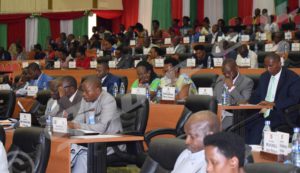The Truth and Reconciliation Commission has presented its provisional report in the National Assembly in the presence of four ministers before the end of its mandate in December 2018.

MPs recommend that the mandate of the Truth and Reconciliation Commission be renewed
MP Gélase Ndabirabe, chairman of the political commission at the National Assembly says CVR has only reached the documentary stage. “After at least four years of operation, CVR has not yet conducted any investigation into crimes committed in Burundi and their perpetrators even if it has started collecting testimonies throughout the country”, says Ndabirabe. He adds that the commission has done a great job but lacked a strategic action plan after four years of work. “CVR members didn’t show MPs how they would proceed with the identification of crimes and their perpetrators,” he says.
As for Révérien Ndikuriyo, speaker of Burundi Senate, he says the commission should not only start its investigation from the time Burundi got its independence but should also go back to the colonial period. “There is a need to work closely with historians. Colonizers have also contributed to the division of Burundians,” he says. For him, the commission should have a mandate of 30 years to achieve tangible results in relation to identifying the crimes and their perpetrators. In that plenary session, almost all MPs have supported the renewal of the mandate of the commission for a quality and fast work.
MP Pierre Céléstin Ndikumana says the commission should not limit itself from the colonial period to 2008. “Even what happened in 2015 constitutes crimes which should be investigated by the commission,” he says.
For Georges Nshimirimana, the mandate of the commission should be renewed but its members could change.
Limited means, few activities
Pascal Barandagiye, Minister of Home Affairs, one of four ministers who were in the National Assembly has said Burundians need to know what happened in the country, the reason why some people have started erecting memorial placards in some area. The minister has referred to the recent memorial plaque erected in Nyambeho area, in Gitega Province which raised controversies.
“The mandate should be extended but the commission must do its best to produce a final report before the end of its mandate”, he says adding that the commission should focus on what was done by colonizers. “If need be, Burundi government could file complaints against the instigators”.
Clotilde Niragira, Secretary of the Truth and Reconciliation Commission says the lack of sufficient funds was the main cause of few activities that the commission did. “The commission had established a strategic action plan amounting to USD 34 million in 2015. Partners have promised to grant immediately USD 10 million but with the outbreak of the 2015 crisis, partners pulled back,” she says. For her, even if the law governing the commission doesn’t allow the release of a provisional report, the commission produced it to present its achievements. She says there will be no final report unless the commission’s mandate is renewed.
The main objective of the Truth and Reconciliation Commission-CVR which was set up in 2014 is to identify all crimes committed in Burundi and perpetrators from 1 July 1962 to 4 September 2008 in order to establish the truth which will lead to the reconciliation among Burundians.



















 IWACU Open Data
IWACU Open Data

